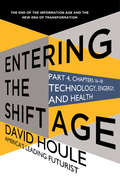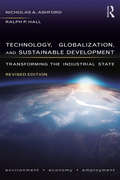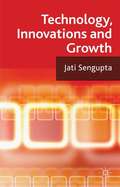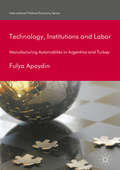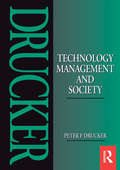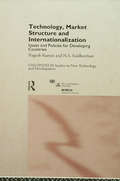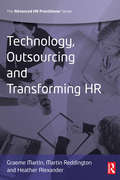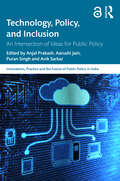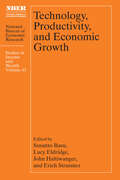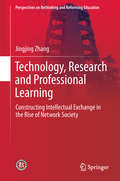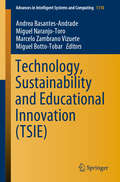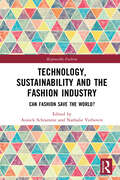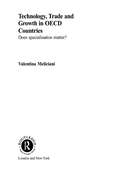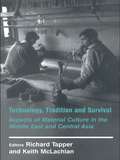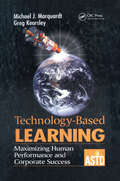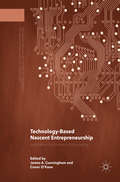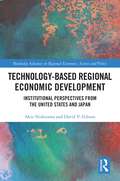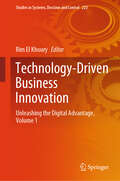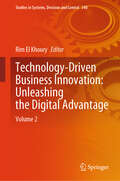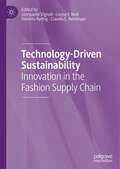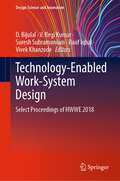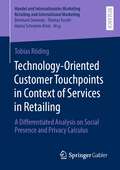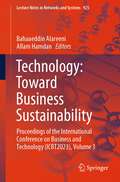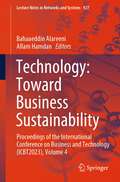- Table View
- List View
Technology, Energy, and Health (Entering the Shift Age, eBook #6)
by David HouleWe are leaving the Information Age and transitioning into the Shift Age, a time of transformation and change that offers both great risk and incredible opportunity. In Entering the Shift Age, David Houle identifies and explains the dynamics and forces that have shaped our world and will continue to reshape our world for the next 20 years. He shows how the Shift Age means a world fully global yet focused on the individual, where the speed of change is so fast that change itself is the new norm. He also comments from the front lines of the Shift Age on issues and topics that affect our lives, from business and technology to environment, media and global culture. eBook 6 looks at three of the most significant areas of change in the Shift Age, offering a high-level tour of the major changes and trends in technology, energy, medicine, and health management.
Technology, Globalization, and Sustainable Development: Transforming The Industrial State
by Nicholas A Ashford Ralph P HallTechnology, Globalization, and Sustainable Development offers a unified, transdisciplinary approach for transforming the industrial state in order to promote sustainable development. The authors present a deep analysis of the ways that industrial states – both developed and developing – are currently unsustainable and how economic and social welfare are related to the environment, to public health and safety, and to earning capacity and meaningful and rewarding employment. The authors offer multipurpose solutions to the sustainability challenge that integrate industrial development, employment, technology, environment, national and international law, trade, finance, and public and worker health and safety. The authors present a compelling wake-up call that warns of the collision course set between the current paths of continued growth and inevitable unsustainability in the world today. Offering clear examples and real solutions, this textbook illustrates how the driving forces that are currently promoting unsustainability can be refocused and redesigned to reverse course and improve the state of the world. This book is essential reading for those teaching and studying sustainable development and the critical roles of the economy, employment, and the environment.
Technology, Innovations and Growth
by Jati K. SenguptaThis book provides detailed empirical analysis of countries in Asia to examine various dynamic models that incorporate the impact of technology and innovations on the industry evolution and overall economic growth.
Technology, Institutions and Labor: Manufacturing Automobiles In Argentina And Turkey (International Political Economy Ser)
by Fulya ApaydinIn this book Fulya Apaydin argues that labor responses to dramatic technological change are influenced by the political institutions of the Global South more than any other factor. In addressing vocational education programs – which are highly relevant in understanding how labor unrest is governed in developing settings – she makes two important contributions. Firstly, she offers a new theoretical framework to understand labor mobilization and de-mobilization patterns, rethinking vocational education as a key transmission belt for manufacturing labor consent. Secondly, she provides a systematic comparison of skill formation schemes and their implications on labor mobilization in federal and unitary systems. With a focus on Argentina and Turkey, two case studies are provided in which technology has provoked differing levels of strikes, walkouts and extended protest.
Technology, Management and Society
by Peter DruckerIn this volume Drucker has collected twelve essays on technology and management and their relationship to, and interaction with, human society. In these essays the reader is able to grasp and savour some of the essential ideas and philosophy that have been expanded into Drucker's various books. In this volume Drucker has collected twelve essays on technology and management and their relationship to, and interaction with, human society. In these essays the reader is able to grasp and savour some of the essential ideas and philosophy that have been expanded into Drucker's various books.
Technology, Market Structure and Internationalization: Issues and Policies for Developing Countries (UNU/INTECH Studies in New Technology and Development #Vol. 5)
by Nagesh Kumar N. S. SiddharthanTechnology, Market Structure and Internationalization discusses the domestic and external factors that impinge upon the process of technological capability building in developing countries and draws policy implications. Specifically, it examines the interaction between technological effort in developing countries. Providing fresh insights, this volume will be of interest to researchers in development economics as well as to those involved with the creation of policy in developing countries.
Technology, Outsourcing & Transforming HR
by Graeme MartinThis book examines the progress made in e-enabling the HR function and the relationship with outsourcing. The editors will review and analyse recent developments in the application of outsourcing and ICT to the HR function and its overall contribution to organizational aims. This text aims to fill the gap in current literature, by providing accessible guidance on how to tackle the e-enablement of the function and on the factors associated with successful outsourcing. There is no single text that adequately deals with this increasingly important problem and which has been recognised by the CIPD as a key area of research for their forward programme. The contributors all have leading-edge knowledge and practical experience and aim to provide practical guidance for organizations and HR professionals.
Technology, Policy, and Inclusion: An Intersection of Ideas for Public Policy (Innovations, Practice and the Future of Public Policy in India)
by Anjal Prakash, Aarushi Jain, Puran Singh, and Avik SarkarTechnology, Policy, and Inclusion looks at the intersections between public policy and technology in India. It explores the barriers in instituting effective governance and development and examines how these can be mitigated through technological interventions in developing countries. Increased digitisation of the economy has added to the development challenges in India and issues such as exclusion and social inequality. This volume stresses the need for governments to leverage technology to bring more vulnerable and marginalised groups into the fold of financial and social inclusion. It also focuses on the importance of regulation for a responsible integration of technologies and minimising risks. The book includes examples and case studies from different areas including management of the COVID-19 pandemic through digital means, real estate digital infrastructure, digital census, e-markets for farmers, and government interventions that use technology to deliver financial services in remote areas of the country. It also outlines various solutions for fostering equity and socio-economic development. Part of the Innovations, Practice and the Future of Public Policy in India series, this volume will be of interest to students and researchers of public policy, political science, development studies, and sociology as well as policy professionals and technocrats. This book is freely available as a downloadable Open Access PDF at http://www.taylorfrancis.com under a Creative Commons (CC-BY-NC-ND) 4.0 license.
Technology, Productivity, and Economic Growth (National Bureau of Economic Research Studies in Income and Wealth)
by Susanto Basu, Lucy Eldridge, John Haltiwanger, and Erich StrassnerA wide-reaching exploration of how technological advancements influence and shape productivity and economic growth. Current technological developments in several industries, such as the rise of artificial intelligence and innovations associated with the green energy transition, are likely to have significant and wide-ranging effects. This volume explores the implications of rapid changes in advanced technology and considers how to conceptualize and model these advances and improve measures of productivity and economic growth. The study of these issues is facilitated both by new methods for using and integrating disparate data sources and by the availability of new data sources. The chapters in this volume leverage these developments to offer fresh insights into long-standing issues in productivity analysis and technological change.
Technology, Research and Professional Learning: Constructing Intellectual Exchange in the Rise of Network Society (Perspectives on Rethinking and Reforming Education)
by Jingjing ZhangThis book investigates the use of network technologies in research, and explores how such use potentially changes the nature of professional learning between academics. It attempts to situate the discussion of technology use in real-world research settings, to identify the different forms of participation in intellectual exchange embedded in academic dialogue, and to further contribute to knowledge on how the use of network technology potentially changes the nature of learning. Multiple data collection methods are employed, in two forms of study: a single case study, and a number of individual interviews. The single case study was carried out over a one-year period, and consisted of interviews (22 interviewees), observations, and document review. Individual semi-structured interviews were carried out over a similar period of time with a wider and different population of 24 academics from different Oxford faculties. Half of these were interviewed twice.The main findings presented in this book demonstrate that the direct consequences of technology use are changes to academic dialogue and scholarly communication in general. The change to this critical aspect of research – scholarly communication – has potentially led to more distributed research in interconnected research environments. It is the changes to scholarly communication and the research environment that consequently affect participation in intellectual exchange.
Technology, Sustainability and Educational Innovation (Advances in Intelligent Systems and Computing #1110)
by Miguel Botto-Tobar Andrea Basantes-Andrade Miguel Naranjo-Toro Marcelo Zambrano VizueteThis book presents the proceedings of International Conference on Knowledge Society: Technology, Sustainability and Educational Innovation (TSIE 2019). The conference, which was held at UTN in Ibarra, Ecuador, on 3–5 July 2019, allowed participants and speakers to share their research and findings on emerging and innovative global issues. The conference was organized in collaboration with a number of research groups: Group for the Scientific Research Network (e-CIER); Research Group in Educational Innovation and Technology, University of Salamanca, Spain(GITE-USAL); International Research Group for Heritage and Sustainability (GIIPS), and the Social Science Research Group (GICS). In addition, it had the endorsement of the RedCLARA, e-science, Fidal Foundation, Red CEDIA, IEEE, Microsoft, Business IT, Adobe, and Argo Systems. The term “knowledge society” can be understood as the management, understanding and co-creation of knowledge oriented toward the sustainable development and positive transformation of society. In this context and on the occasion of the XXXIII anniversary of the Universidad Técnica del Norte (UTN), the Postgraduate Institute through its Master of Technology and Educational Innovation held the I International Congress on Knowledge Society: Technology, Sustainability and Educational Innovation – TSIE 2019, which brought together educators, researchers, academics, students, managers, and professionals, from both the public and private sectors to share knowledge and technological developments. The book covers the following topics: 1. curriculum, technology and educational innovation; 2. media and education; 3. applied computing; 4. educational robotics. 5. technology, culture, heritage, and tourism development perspectives; and 6. biodiversity and sustainability.
Technology, Sustainability and the Fashion Industry: Can Fashion Save the World? (Responsible Fashion)
by Annick Schramme Nathalie VerbovenThere is widespread rhetorical agreement that the fashion industry must get itself onto a more sustainable footing. What does this mean in practice, and how can sustainability be achieved in different regions around the world? This book brings together expert scholars and reflective practitioners via a network of dialogue and exchange to help drive forward a sustainable future for the fashion industry. With a focus on technological innovation, the contributions to this book provide a range of case studies from design thinking, through digital clothing and inclusive fashion. This book will be of interest to researchers and scholars in the fields of circular business and the fashion industry, and provides a unique resource for readers seeking to understand more about the need for responsible fashion and how technology might be able to help.
Technology, Trade and Growth in OECD Countries: Does Specialisation Matter? (Routledge Studies In The Modern World Economy Ser.)
by Valentina MelicianiPresenting new material and a fresh perspective, Technology, Trade and Growth in OECD Countries, provides a unifying framework for the exploration of the role played by specialisation in economic growth and international competitiveness.
Technology, Tradition and Survival: Aspects of Material Culture in the Middle East and Central Asia (History and Society in the Islamic World)
by Richard Tapper Keith McLachlanThe contributors address the history, originality, variety and sophistication of traditional science, technology and material culture in the Middle East and Central Asia, their influence on the history of Europe and the West, and the threat posed by modern Western technologies.
Technology-Based Learning: Maximizing Human Performance and Corporate Success
by Michael J. Marquardt Greg KearsleyCompanies worldwide are recognizing the critical importance of harnessing the learning capabilities of people and technology in the workplace. Technology-Based Learning:Maximizing Human Performance and Corporate Success shows how to capture and leverage this power, through techniques of knowledge management.This comprehensive overview examines the advantages and disadvantages of learning technologies, and provides a guide for selecting, costing, and applying the various techniques.Technology in the workplace has many overwhelming possibilities-so many that they've left many managers and HRD professionals confused and perplexed. Let Marquardt and Kearsley show you how to bring technology under control to meet the needs of your company and your employees.
Technology-Based Nascent Entrepreneurship
by James A. Cunningham Conor O’kaneThis edited volume presents new means of quantifying the behavioral and consequential differences between technology-based and non-technology-based nascent entrepreneurs in varied economies. It explores the socioeconomic place of technology in developed and developing countries, and describes the implications of this research for policymakers' ability to identify and support new areas of economic growth. This book also examines technology-based nascent entrepreneurship issues in the context of entrepreneurial leadership, business incubation, ethnic migrants, university researchers, new venture formation activities, student entrepreneurship, and start-up competitions. The contributors to this collection provide valuable insights for the growing study of and expanding policies addressing nascent entrepreneurship.
Technology-Based Regional Economic Development: Institutional Perspectives from the US and Japan (Routledge Advances in Regional Economics, Science and Policy)
by David V. Gibson Akio NishizawaRegional technology-based economic development and the recruitment and retention of talent is a top priority of city-regions in the United States and in countries around the world. However, policy recommendations from government officials, industry leaders and academics are often ambiguous or are in conflict. To address these issues, this book deals with the complex intersection of institutional theory and national and regional policy initiatives.It provides an overview of United States and Japanese technology policy development at the national level with case analyses of Austin, Texas and Tsuruoka, Japan to identify key regional strategies and processes that have resulted in successful endogenous technology-based business development and job creation. It offers an innovative analytical perspective to improve our understanding of how successful tech-based regional economic development works in theory and practice. The book’s discussion is grounded on important technology paradigm shifts in the US and Japan from 1970 to 1980 leading to current realities. To address the complex “Puzzle of Space” conundrum, the authors describe similarities and differences in regional development processes in Austin and Tsuruoka. They present a generalizable model indicating necessary and sufficient conditions linked to the building of new “Small i” institutions at normative and cognitive levels of analysis in consort with regulative policy and innovations at macro level “Capital I” institutions. The book clearly explains the relations between institutions and economic growth, an important issue in contemporary economics.The book’s conclusions clarify critical success factors for endogenous regional development growth theory and lead to recommendations for policymakers who are searching for ways to achieve success.
Technology-Driven Business Innovation: Unleashing the Digital Advantage, Volume 1 (Studies in Systems, Decision and Control #223)
by Rim El KhouryThis book aims to provide a comprehensive understanding of the interplay between technology and business and its implications for future growth and innovation. In today's rapidly changing world, technology plays a crucial role in shaping the business landscape. Advancements in artificial intelligence, blockchain, data analytics, and automation have revolutionized how organizations operate, compete, and achieve success. Understanding the profound impact of technology on business is vital for entrepreneurs, managers, policymakers, and academics alike. This book aims to explore the connection between technology and business, highlighting its importance in driving transformative changes across various industries. We welcome scholars, researchers, and practitioners to share their expertise and insights in this exciting endeavor.This book captures the essence of exploring the dynamic relationship between technology and business, emphasizing the potential for innovation and growth. It conveys the idea of embracing the transformative power of technology within the business realm and the opportunities it presents for unleashing new ideas and strategies.By delving into various aspects such as emerging technologies, business strategies, innovation, and ethical considerations, it aims to provide a comprehensive understanding of the symbiotic relationship between technology and business. It offers insights into the integration of technology into decision-making processes, the transformative impact on different industries, and strategies for leveraging technology to drive organizational growth and sustainability.Furthermore, the book highlights real-world case studies, explores emerging trends, and discusses the ethical and social implications of technology adoption in the business context. It serves as a valuable resource for entrepreneurs, managers, policymakers, academics, and anyone interested in understanding and harnessing the potential of technology for business success. This book aims to be a valuable resource for individuals interested in the transformative power of technology in the business realm. By compiling a collection of insightful chapters, it offers readers a diverse range of perspectives, frameworks, and case studies that shed light on the complexities and opportunities associated with technology-driven business environments.
Technology-Driven Business Innovation: Volume 2 (Studies in Systems, Decision and Control #540)
by Rim El KhouryIn today's rapidly changing world, technology plays a crucial role in shaping the business landscape. Advancements in artificial intelligence, blockchain, data analytics, and automation have revolutionized how organizations operate, compete, and achieve success. Understanding the profound impact of technology on business is vital for entrepreneurs, managers, policymakers, and academics alike. This book aims to provide a comprehensive understanding of the interplay between technology and business and its implications for future growth and innovation. This book aims to explore the connection between technology and business, highlighting its importance in driving transformative changes across various industries. We welcome scholars, researchers, and practitioners to share their expertise and insights in this exciting endeavor. This title captures the essence of exploring the dynamic relationship between technology and business, emphasizing the potential for innovation and growth. It conveys the idea of embracing the transformative power of technology within the business realm and the opportunities it presents for unleashing new ideas and strategies. By delving into various aspects such as emerging technologies, business strategies, innovation, and ethical considerations, it aims to provide a comprehensive understanding of the symbiotic relationship between technology and business. It offers insights into the integration of technology into decision-making processes, the transformative impact on different industries, and strategies for leveraging technology to drive organizational growth and sustainability. Furthermore, the book highlights real-world case studies, explores emerging trends, and discusses the ethical and social implications of technology adoption in the business context. It serves as a valuable resource for entrepreneurs, managers, policymakers, academics, and anyone interested in understanding and harnessing the potential of technology for business success. This book aims to be a valuable resource for individuals interested in the transformative power of technology in the business realm. By compiling a collection of insightful chapters, it will offer readers a diverse range of perspectives, frameworks, and case studies that shed light on the complexities and opportunities associated with technology-driven business environments.
Technology-Driven Sustainability: Innovation in the Fashion Supply Chain
by Claudia E. Henninger Daniella Ryding Gianpaolo Vignali Louise F. ReidThis book provides a critical overview of technologies that are used within the fashion industry and supply chain, with a special emphasis on how they engender sustainability and the circular economy. The chapters present contemporary case studies alongside new research on technologies such as 3D printing, 3D scanning and recycling technology to assess the effect they will have on the future of fashion and its global supply chain.
Technology-Enabled Work-System Design: Select Proceedings of HWWE 2018 (Design Science and Innovation)
by Rauf Iqbal Vivek Khanzode Bijulal D. Regi Kumar V Suresh SubramoniamThis volume presents selected papers presented during the 16th International Conference on Humanizing Work and Work Environment (HWWE 2018). The book presents a confluence of ideas on ergonomics and technology implementation to improve workplace environments and work systems to maximize effectiveness and performance. The volume is thematically arranged, with papers covering different aspects of ergonomics and design. The volume will be of use to researchers, practitioners and students working in different fields of ergonomics.
Technology-Oriented Customer Touchpoints in Context of Services in Retailing: A Differentiated Analysis on Social Presence and Privacy Calculus (Handel und Internationales Marketing Retailing and International Marketing)
by Tobias RödingIn this book, Tobias Röding addresses the topic of technology use along different touchpoints in context of different services in retailing, both in offline and online retail, with a total of eight essays. In particular, the interaction of technology use and the frontline employee is also considered and a special focus is placed on aspects of data disclosure by customers. In this context, the essays concentrate in varying degrees on the social interaction between customer, frontline employee and a service-technology, as well as on the balancing of benefits and risks for the customer in a possible disclosure of personal information. Based on the essays' findings, implications for both practice and academia are provided..
Technology: One Dimension of Adaptive Project Management
by Aaron J. Shenhar Dov DvirGreater technological uncertainty requires an extensive design effort, more testing, and later freezing of the design, and managers with greater technical savvy. This chapter examines the often tricky process of assessing a project's technology level.
Technology: Proceedings of the International Conference on Business and Technology (ICBT2023), Volume 3 (Lecture Notes in Networks and Systems #925)
by Allam Hamdan Bahaaeddin AlareeniThis book proceedings addresses a crucial gap in understanding the impact of technology on Business Model Innovation (BMI). It emphasizes the need for further research to explore the intricate relationship between technology and BMI, focusing on opportunities and challenges. By delving into how technology influences emerging business model innovations and enhances operational efficiency, the publication aims to advance knowledge. Inviting diverse research methods, it sheds light on various ideas within the technology and BMI realm. Tailored for students, scholars, professionals, and policymakers, this book contributes to the evolving field of BMI and technology.
Technology: Proceedings of the International Conference on Business and Technology (ICBT2023), Volume 4 (Lecture Notes in Networks and Systems #927)
by Allam Hamdan Bahaaeddin AlareeniThis book proceedings addresses a crucial gap in understanding the impact of technology on Business Model Innovation (BMI). It emphasizes the need for further research to explore the intricate relationship between technology and BMI, focusing on opportunities and challenges. By delving into how technology influences emerging business model innovations and enhances operational efficiency, the publication aims to advance knowledge. Inviting diverse research methods, it sheds light on various ideas within the technology and BMI realm. Tailored for students, scholars, professionals, and policymakers, this book contributes to the evolving field of BMI and technology.
